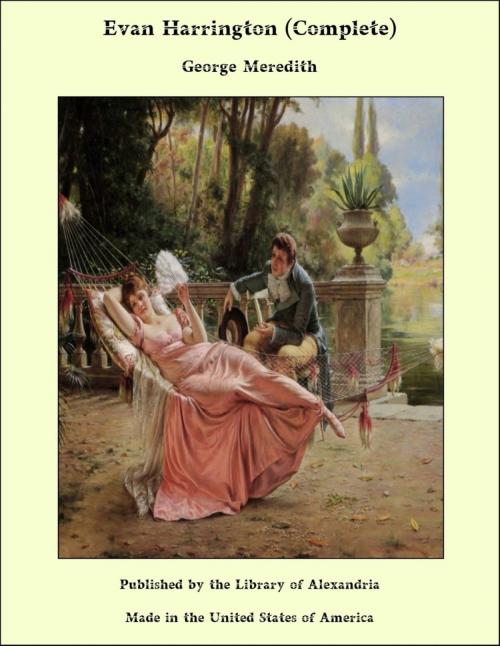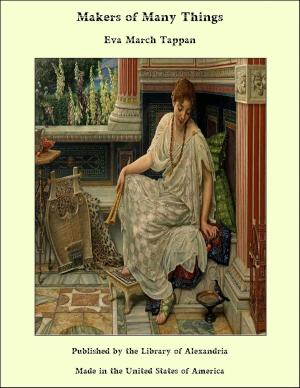Evan Harrington (Complete)
Nonfiction, Religion & Spirituality, New Age, History, Fiction & Literature| Author: | George Meredith | ISBN: | 9781465558671 |
| Publisher: | Library of Alexandria | Publication: | March 8, 2015 |
| Imprint: | Language: | English |
| Author: | George Meredith |
| ISBN: | 9781465558671 |
| Publisher: | Library of Alexandria |
| Publication: | March 8, 2015 |
| Imprint: | |
| Language: | English |
On a more intimate acquaintance with the couple, you acknowledge the aptness of the fine distinction. By birth Mrs. Harrington had claims to rank as a gentlewoman. That is, her father was a lawyer of Lymport. The lawyer, however, since we must descend the genealogical tree, was known to have married his cook, who was the lady's mother. Now Mr. Melchisedec was mysterious concerning his origin; and, in his cups, talked largely and wisely of a great Welsh family, issuing from a line of princes; and it is certain that he knew enough of their history to have instructed them on particular points of it. He never could think that his wife had done him any honour in espousing him; nor was she the woman to tell him so. She had married him for love, rejecting various suitors, Squire Uplift among them, in his favour. Subsequently she had committed the profound connubial error of transferring her affections, or her thoughts, from him to his business, which, indeed, was much in want of a mate; and while he squandered the guineas, she patiently picked up the pence. They had not lived unhappily. He was constantly courteous to her. But to see the Port at that sordid work considerably ruffled the Presence—put, as it were, the peculiar division between them; and to behave toward her as the same woman who had attracted his youthful ardours was a task for his magnificent mind, and may have ranked with him as an indemnity for his general conduct, if his reflections ever stretched so far. The townspeople of Lymport were correct in saying that his wife, and his wife alone, had, as they termed it, kept him together. Nevertheless, now that he was dead, and could no longer be kept together, they entirely forgot their respect for her, in the outburst of their secret admiration for the popular man. Such is the constitution of the inhabitants of this dear Island of Britain, so falsely accused by the Great Napoleon of being a nation of shopkeepers. Here let any one proclaim himself Above Buttons, and act on the assumption, his fellows with one accord hoist him on their heads, and bear him aloft, sweating, and groaning, and cursing, but proud of him! And if he can contrive, or has any good wife at home to help him, to die without going to the dogs, they are, one may say, unanimous in crying out the same eulogistic funeral oration as that commenced by Kilne, the publican, when he was interrupted by Barnes, the butcher, 'Now, there's a man!—' Mrs. Harrington was sitting in her parlour with one of her married nieces, Mrs. Fiske, and on reading Lady Racial's card she gave word for her to be shown up into the drawing-room. It was customary among Mrs. Harrington's female relatives, who one and all abused and adored the great Mel, to attribute his shortcomings pointedly to the ladies; which was as much as if their jealous generous hearts had said that he was sinful, but that it was not his fault. Mrs. Fiske caught the card from her aunt, read the superscription, and exclaimed: 'The idea! At least she might have had the decency! She never set her foot in the house before—and right enough too! What can she want now? I decidedly would refuse to see her, aunt!'
On a more intimate acquaintance with the couple, you acknowledge the aptness of the fine distinction. By birth Mrs. Harrington had claims to rank as a gentlewoman. That is, her father was a lawyer of Lymport. The lawyer, however, since we must descend the genealogical tree, was known to have married his cook, who was the lady's mother. Now Mr. Melchisedec was mysterious concerning his origin; and, in his cups, talked largely and wisely of a great Welsh family, issuing from a line of princes; and it is certain that he knew enough of their history to have instructed them on particular points of it. He never could think that his wife had done him any honour in espousing him; nor was she the woman to tell him so. She had married him for love, rejecting various suitors, Squire Uplift among them, in his favour. Subsequently she had committed the profound connubial error of transferring her affections, or her thoughts, from him to his business, which, indeed, was much in want of a mate; and while he squandered the guineas, she patiently picked up the pence. They had not lived unhappily. He was constantly courteous to her. But to see the Port at that sordid work considerably ruffled the Presence—put, as it were, the peculiar division between them; and to behave toward her as the same woman who had attracted his youthful ardours was a task for his magnificent mind, and may have ranked with him as an indemnity for his general conduct, if his reflections ever stretched so far. The townspeople of Lymport were correct in saying that his wife, and his wife alone, had, as they termed it, kept him together. Nevertheless, now that he was dead, and could no longer be kept together, they entirely forgot their respect for her, in the outburst of their secret admiration for the popular man. Such is the constitution of the inhabitants of this dear Island of Britain, so falsely accused by the Great Napoleon of being a nation of shopkeepers. Here let any one proclaim himself Above Buttons, and act on the assumption, his fellows with one accord hoist him on their heads, and bear him aloft, sweating, and groaning, and cursing, but proud of him! And if he can contrive, or has any good wife at home to help him, to die without going to the dogs, they are, one may say, unanimous in crying out the same eulogistic funeral oration as that commenced by Kilne, the publican, when he was interrupted by Barnes, the butcher, 'Now, there's a man!—' Mrs. Harrington was sitting in her parlour with one of her married nieces, Mrs. Fiske, and on reading Lady Racial's card she gave word for her to be shown up into the drawing-room. It was customary among Mrs. Harrington's female relatives, who one and all abused and adored the great Mel, to attribute his shortcomings pointedly to the ladies; which was as much as if their jealous generous hearts had said that he was sinful, but that it was not his fault. Mrs. Fiske caught the card from her aunt, read the superscription, and exclaimed: 'The idea! At least she might have had the decency! She never set her foot in the house before—and right enough too! What can she want now? I decidedly would refuse to see her, aunt!'















